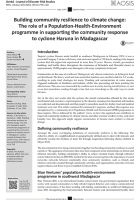Introduction
Tropical cyclone Haruna made landfall in southwest Madagascar in February 2013; it was a powerful Category 2 storm with heavy rain and wind speeds of 150 km/h, making it the largest cyclone that this region had experienced in more than 35 years. Houses, schools, government buildings and health clinics throughout the communes of Befandefa and Morombe (home to approximately 15000 people) were damaged, with many completely destroyed. Communities in this area of southwest Madagascar rely almost exclusively on fishing for food and livelihood. The heavy wind and rain meant that families were unable to fish for 1–2 weeks, resulting in acute food shortages for many. Flooding and contamination of water sources triggered outbreaks of diarrhoea and malaria, whilst also preventing aid from reaching the affected area. This area was inaccessible by road for over 6 weeks, leaving travel by boat, ox cart or on foot (sometimes wading through water that was chest-deep) as the only ways to reach the area.
Yet, in the days and weeks after the cyclone, the coastal communities affected by this storm coordinated and executed a rapid response to the disaster, ensuring that important information was collected and disseminated and that people’s immediate needs for shelter, food and medical treatment were met. This article examines the community’s response, and how this response was strengthened by a community-level Population, Health and Environment (PHE) programme in these regions. This is followed by the authors’ views on how this approach can contribute to improved community resilience to climatic shocks and other extreme weather events, and more broadly, how this approach might support communities to become more resilient to climate change.
Keywords
climate change; resilience; population-health-environment; Haruna

















